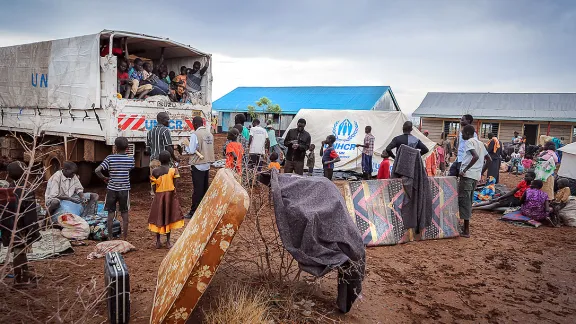
UNHCR and LWF response to South Sudanese refugees in Maban refugee camp. Photo: Mats Wallerstedt
“You go where others don't”
(LWI) – UNHRC’s partnership with the LWF is “extremely valuable” said UNHCR Director of the Regional Bureau for Africa George Okoth-Obbo and Director of the Division of External Relations Daniel Endres speaking to the Lutheran World Federation Committee for World Service meeting in January in Geneva.
“For 58 years we have been standing side by side ”, Mr Okoth-Obbo said. During the meeting reference was made to the Memorandum of Understanding (MoU) on Strategic Partnership between UNHCR and LWF signed 3 October 2014 which re-confirmed this close cooperation. The LWF is the fourth largest implementing partner of the UN Refugee Agency. “You go where others don´t go”, Okoth-Obbo added, “you are right there with us”.
In discussion with CWS members on 22 January at the UNHCR, Mr Okoth-Obbo talked about the refugee situation worldwide with a special focus on Africa, where LWF is working in 11 countries, partnering with UNHCR in seven of them. Two of them, the Central African Republic and South Sudan, have been classified as most severe, large-scale humanitarian crises (Level 3-emergencies) by the UN. “A larger proportion of the displacements in Africa today are internally displaced persons (IDPs),” Mr Okoth-Obbo said, citing the example of South Sudan which has seen more displacement in the past year than in the previous three decades of civil war.
Nigeria the Next Emergency
As the refugee situation worldwide grows more challenging, the UNHCR representatives emphasized the advantages of working with a globally rooted faith-based organization. “We are structured to work with states, you work with communities”, Mr Okoth-Obbo said, stressing especially the need for development and education projects and a “theme based” approach like the LWF focus on protection, poverty and vulnerable communities.
“We have never seen a situation like today,” UNHCR Director for External Relations Daniel Endres said. While one third of the UNHCR capacity is engaged in the emergencies in Iraq and Syria, protracted” refugee situations in Afghanistan, Pakistan, Mali, the Democratic Republic of Congo and Somalia still require sustained support and attention.
“We don’t see an end to the crises,” he said. Both Directors especially warned about the situation in Nigeria and the recent terrorist activities there. “If the horrifying proportion of the terrorist threat continues unabated, we will witness the next serious displacement emergency,” Mr Endres said.
Rights-Based Approach
Mr Endres especially emphasized the need for a rights-based approach in working with refugees and other persons of concern. As governments are increasingly challenged to manage refugee integration, he also stressed the need for advocating and working with host communities.
Cooperation with a faith-based organization is an “added value” he said, as in many communities faith groups have a natural authority. In that context, UNHCR is also very interested in the development of the partnership between the LWF and Islamic Relief Worldwide, who signed a Memorandum of Understanding in August 2014. “Faith-based organizations are motivated by their faith and can and do play important - often essential - roles in reaching out to communities and vulnerable people” ”, Mr Endres said. “We see that, we feel that and we appreciate that”.


